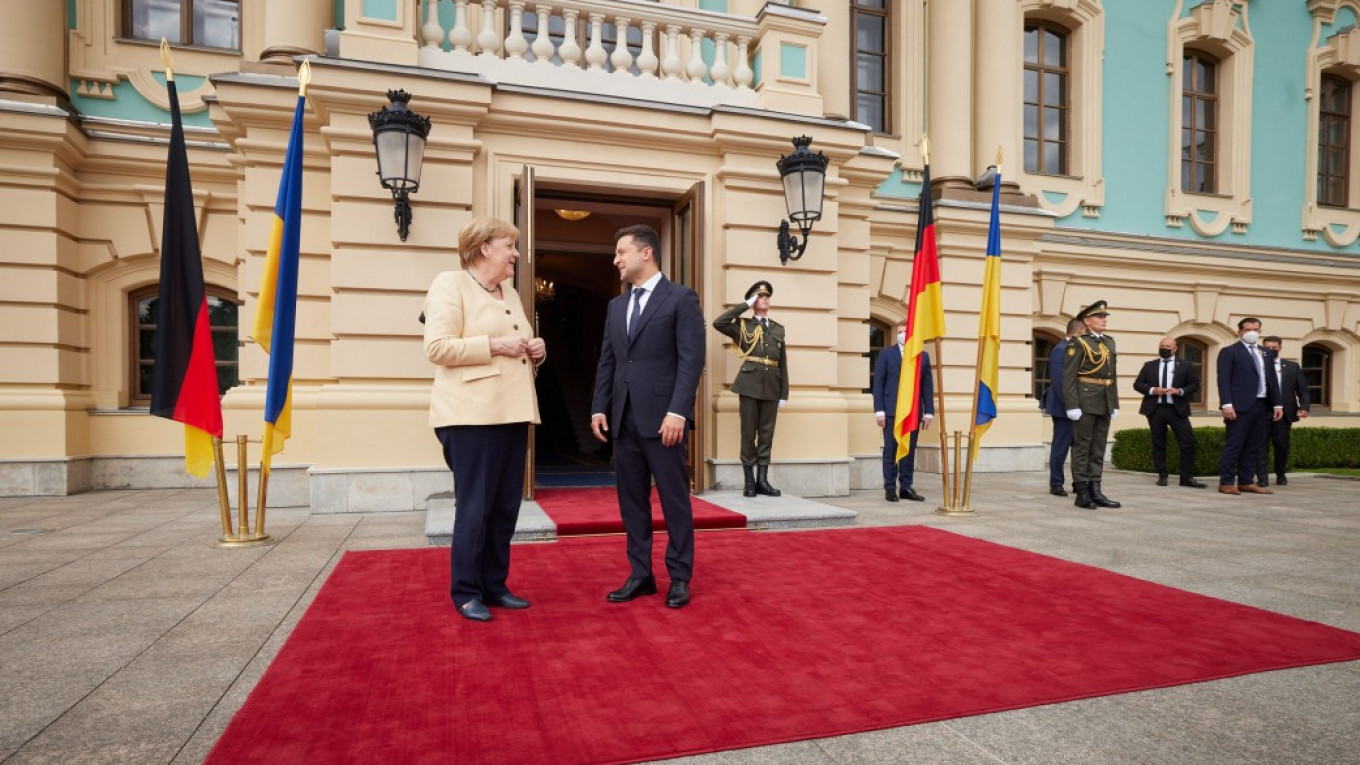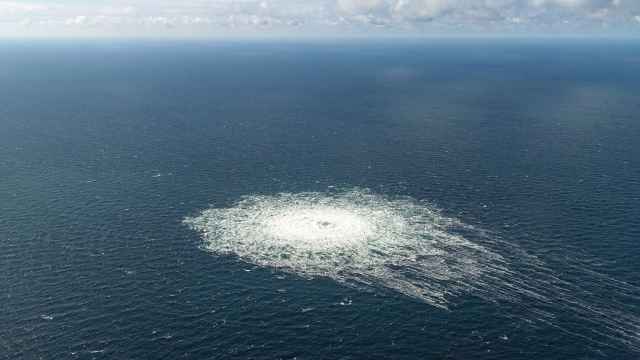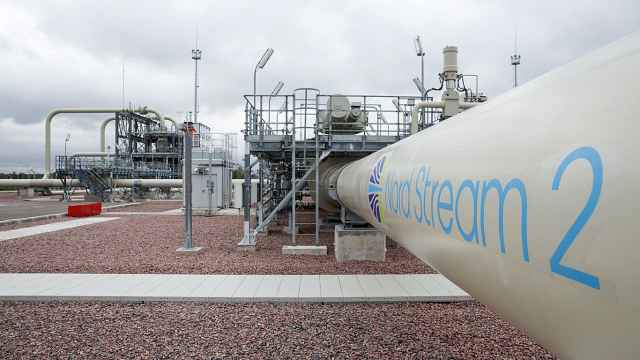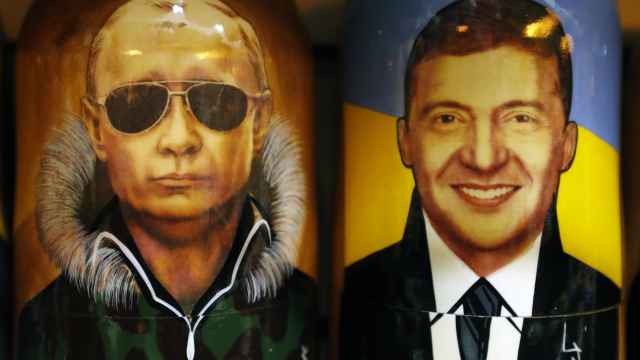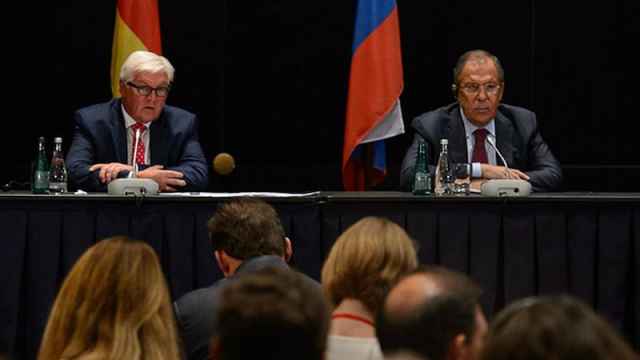Ukrainian President Volodymyr Zelenskiy warned German Chancellor Angela Merkel Sunday that the soon-to-be completed Nord Stream 2 pipeline carrying Russian gas to Europe was "a dangerous geopolitical weapon."
The comments came as the two leaders met in Kiev for a last time ahead of Merkel leaving office after 16 years in power next month and days after she held final talks with Russian President Vladimir Putin in Moscow.
Bypassing Ukraine and depriving the Western ally of essential gas transit fees Kiev estimates to be at least $1.5 billion per year, Nord Stream 2 is set to double Russian natural gas shipments to Germany, Europe's largest economy.
Kiev fiercely opposes the pipeline, arguing that it will increase Europe's energy dependence on Russia and Moscow's geopolitical clout.
"We view this project exclusively through the prism of security and consider it a dangerous geopolitical weapon of the Kremlin," Zelenskiy said during a joint press conference with Merkel.
While the main risks after the completion of the $12-billion pipeline beneath the Baltic Sea would be "borne by Ukraine," he said, it would also be dangerous "for all of Europe."
Merkel said Berlin agreed with Washington that "gas must not be used as a geopolitical weapon.
"It will come down to if there is an extension to the transit contract via Ukraine — the sooner the better," she said, referring to the expiry of Moscow's agreement with Kiev in 2024.
'A special responsibility'
While the construction of the pipeline led to tensions between Germany and the United States, Washington eventually waived sanctions against the Russian-controlled builder of the pipeline.
Merkel on Sunday sought to reassure Zelenskiy, saying that the Germany-U.S. agreement specified "sanctions" if gas was "used as a weapon."
These commitments are "binding on future German governments," she noted.
She also said she had discussed with Putin extending Russia's transit contract with Ukraine past 2024.
"We feel a special responsibility" and "understand the big concerns that President Zelensky expressed," she said. "We take them very seriously."
The Ukrainian leader, however, said that while he and Merkel had discussed the extension, he had heard only "very general things."
In addition to the pipeline issue, the two leaders also discussed Ukraine's protracted conflict with pro-Russia separatists in its east, which has claimed more than 13,000 lives.
Merkel has helped mediate in the conflict, which broke out after Moscow annexed Crimea in 2014.
The following year she played a crucial role in clinching the Minsk peace accords, which helped halt the fiercest clashes.
'Going in circles'
But many in Ukraine think the deal, which assumes some autonomy for the breakaway parts of the Donetsk and Lugansk regions, was unfavorable for Kiev and is difficult to fulfill.
They also worry whether it will hold after Merkel's departure from office.
On Sunday, the German leader said she remained in favor of the current format of mediation between Kiev and Moscow led by Berlin and Paris because they have allowed the sides to "talk."
"Without that we'd have no contact whatsoever," she said
But she acknowledged that the results were "not satisfactory" because "Russia is directly involved in this conflict," which vindicated Ukraine's decision not to talk directly with the separatists.
"Therefore, we're in a situation where the talks are going in circles," she said.
Despite her strong backing of Ukraine, Merkel has also frustrated Kiev in her opposition to sending arms there.
On Sunday, Zelenskiy said that despite Germany's continued refusal to send weapons, Kiev was still "counting on it and expecting it."
A Message from The Moscow Times:
Dear readers,
We are facing unprecedented challenges. Russia's Prosecutor General's Office has designated The Moscow Times as an "undesirable" organization, criminalizing our work and putting our staff at risk of prosecution. This follows our earlier unjust labeling as a "foreign agent."
These actions are direct attempts to silence independent journalism in Russia. The authorities claim our work "discredits the decisions of the Russian leadership." We see things differently: we strive to provide accurate, unbiased reporting on Russia.
We, the journalists of The Moscow Times, refuse to be silenced. But to continue our work, we need your help.
Your support, no matter how small, makes a world of difference. If you can, please support us monthly starting from just $2. It's quick to set up, and every contribution makes a significant impact.
By supporting The Moscow Times, you're defending open, independent journalism in the face of repression. Thank you for standing with us.
Remind me later.


